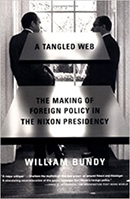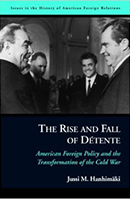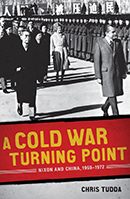Watergate: Psychoanalyst View
By Kelvin Vo

Leo Rangell
An American psychoanalyst and clinical professor based in Los Angeles, Leo Rangell has spent his life studying the role of Freudian theory in people. President of the International Psychoanalytic Association and the American Psychoanalytic Association, he pushed the boundaries of the science of the brain until he passed away at 97.



Forever associated with our 37th president of the United States, the Watergate scandal will never be wiped clean from Richard Nixon’s reputation. In such a period of dark tension and paranoia, he was caught for a crime that many believed others had done, but not gotten caught for. He may have been simply in the wrong place at the wrong time, combined with “his fear that the people would see through him, that they would know.”1 In The Mind of Watergate, by Leo Rangell, he discusses the phenomenon of the “compromise of integrity” and not only the events that led up to the resignation of Nixon and beyond, but the emotional aspects of Watergate. From the viewpoint of a psychoanalyst, a previously unexplored account of the scandal is chronicled while attempting to understand the intricate relations within the White House and those under Nixon. Arguing that the compromise of integrity is “the central problem of human character”, Rangell discusses the buildup of pressures that explain the reasons behind the natural sequence of Nixon’s rise and fall.
Rangell states that similar pressures on integrity play out at the top with powerful executives and politicians, but also with the everyday common people as well, focusing on Nixon as his prime example. Conflicts of interest often battle between instinctual urges and the ego that holds them back; a struggle that varies between different people. Stating ambition, power, and opportunism as the “three horsemen” of the compromise of integrity, Rangell credits these as very common aspects that were especially true of Nixon and caused a vicious cycle that eventually consumed his person. However, the author clarifies that he does not wish to denounce these three qualities, as they come along with competence and skill, so “we should not fall into the trap of misusing these words to discredit people who achieve.”2 Rangell believes that the standoff of the ego (realistic goals, modified by direct influence of the outside world) against the superego (conscience and ideal self) was never an issue, as Nixon could satisfy ambition at his will, but always claiming his actions to be for the sake of the country or national security. Rangell also discusses the peculiarity that although Watergate actually existed for two years, only one year is really discussed and remembered, beginning from when the event was widely publicized rather than when it was committed or discovered. Rangell believes that the combination of Nixon’s re-election and the ending of the Vietnam War were successful in the submersion of Watergate and the three events were brilliantly fused together. Because of Nixon’s opportunism and his successful association of himself with loyalty, the scandal was unnecessary but the great factor in chance led to events playing out the way they did.
A big question that Rangell proposed and analyzed was in looking at why Nixon did not destroy the famous tapes that were eventually confiscated and used as powerful evidence, tainting Nixon’s accomplishments such as in détente and foreign affairs. A product of narcissism, or “self-love”, the criminal feels the need to watch their own crime and relive it. Rangell asks in wonder, “Did he feel that safe? Or was he that careless? Or was he so unthinking?”1 Contradictions are Nixon’s go-to method of survival in the political world: as he claims to have ordered his own investigation of Watergate, his actions actually obstruct the administration of justice rather than facilitate it. Nixon’s standards of political behavior influenced himself as well as those under him, as the concept of “pseudo-stupidity” is discussed. Assuming a fake attitude, individuals protecting themselves by “sharing and overlooking immoral behavior become invisible…the individual saw nothing, heard nothing, and had to react to nothing.”3 Rangell defines credibility and sincerity, claiming Nixon to have neither while always relying on gut reactions and emotions. Using metaphors and slogans, Nixon uses rhetoric to lead himself out of troubles and reassure the nation, but Rangell criticizes this method as “words are used to avoid facts, not convey them”.4 The author compares Nixon to a surfer, able to ride the waves as contrasting feelings and trends to maximize his success in the political game, using this to advance his own ambitions. However, Rangell acknowledges that Nixon’s reputation for détente and cooperation among foreign countries was as strong as the darker parts of his presidency, and that he had the capabilities while growing with the role, solving problems and innovating. Nixon’s paranoia and his skewed relationship between the leader and the led and exploitation of the “silent majority” contributed to his falling out with the nation.
As the walls began to close in on Nixon, he was able to find ways to hold on for as long as possible before accepting the inevitable. Charged with impeachment on three different articles, he held on to faith even though he was trapped, as the incurable optimist. Nixon stated that he did not wish to resign and that he would accept the process of the trials. Even in his exit speech, Rangell notes that it is another cover up, refusing to accept the fact that he had done terrible things to both his administration and the American people by lying to them for years. New evidence continued to cover up the old, as the nation seemed only able to focus on one source at a time. The tapes became the crime, as the actual crime was covered up and hidden away by the attention given to evidence. Rangell states of Nixon that “Other presidents, or aspirants to that top position, have had equally high ambition but not as low self-esteem”, which lead to his inability to trust the people he served, crippling his efforts due to narcissistic invincibility.5 The absence of depression and doubt in Nixon led him to deny the facts and dire problems in his fall. Rangell questions if Nixon actually knew about the scheme before it happened and discusses the way the President was portrayed as ignorant and uninvolved to the entire occurrence, armored by his closest supporters and politicians. Unfortunately, these people believed themselves to be faithful to the president, proud to be serving him and never really questioning the morals behind the acts. Rangell seems to ask if things can ever be moral in the interest of the greater good for the nation while exploring Nixon’s infrastructure as president.
After years of Nixon’s tricks and techniques, the general public was familiar with the way he operated and attempted to seduce the people, leaving him unable to create the same effect. They understood the way Nixon used doubletalk and could judge Nixon for themselves. In an address given about Watergate, Nixon was still unable to come clean in a complete sense: “Insight and defenses, confessions and denials alternate and are fused, every hint of beginning to come clean followed immediately by a justification of his acts.”6 In continued criticism of Nixon, Rangell shows the audience’s lasting attraction with the ex-president’s words, but the fact that he had not changed for the better, still paranoid and dividing the people in opinion just as he did in office. Nixon surprised some with his humbleness and the admission of his crimes, but satisfied other’s expectations when he did not fully commit to showing that he was at fault, but instead repeating the way he originally behaved. Nixon eventually explained that he felt it was a good idea to hold onto the tapes due to the contradictions he could hold against his persecutors, or the “other side”, but later reflected that the tapes led to his own downfall. Rangell provides evidence for Nixon being the true imperial president, in control of monitoring and supervising every action that happened in his own realm. To some, Watergate was only an affair that showed Nixon was a human being, not to interfere with his foreign and domestic accomplishments. Regardless, it will remain in his history and affects how power is expected to be used properly by those wielding the power.
In this work, Rangell explores Watergate through the emotional experiences and the psychological explanations behind why individuals under Nixon and Nixon himself behaved. He asserts that the compromise of integrity through narcissism and the abuse of ambition, power, and opportunism are what led Nixon to his eventual demise. Rangell believes in the ability for man to transcend their nature, but they often do not do so because of its extremely powerful influence. Believing that “man’s nature is to pass beyond nature”, it is only natural that the compromise of integrity exists in all levels of society.7 Because Nixon could not control his ambitions, his self-esteem and paranoia caused him to do anything possible to keep his dreams alive. Rangell intends to look at Watergate through a different perspective to show the intricate nature behind the scandal and to apply his knowledge to something he had real connection and interest in. Although a central character issue of all men today, the compromise of integrity is not a conscious effort, but a very gradual, internal and unconscious act. Attributing much of this to the influence of the group, men under Nixon failed to stand against and have the courage to retain their integrity in the face of adversity. Rangell studies not only Nixon’s fall and his personal role in the scandal, but the ripple effect it had on the men under him and the people. Wondering how Nixon’s style and tone of words was accepted so easily, Rangell sees through Nixon’s behavior but gives credit to his polarization of the nation and his acceptance as the most powerful leader in America. Rangell analyzes Nixon as the one who got caught for his crimes and suffered the consequences of being shown in the nation’s spotlight for it.
Rangell succeeds in writing a passionate work: as a pioneer of Freudian theory of psychology, focusing on the aspects of the ego, id, and superego, Rangell applies these ideas to chronicle Nixon and the way he created a nearly instant connection between himself and the people. This is what initially captured Rangell and drew him towards this topic, as well as the same age and immigration to California after World War II. Reaching the role of president of the International Psychoanalytic Association, Rangell states: “this made me know, in a miniscule way, what it was like to be entrusted with a position of leadership.”8 Rangell was heavily influenced by his education and found Nixon the perfect example of his studies, but he was also interested beyond the scientific interest. His perspective is very detached and objective, thoroughly explaining Nixon through psychological explanation, but also seems to be at times very critical. As a psychoanalyst, Rangell is above the rest in being able to see through Nixon’s rhetoric and the methods he used to somehow create an instant “marriage” between Nixon and the people. The increased political awareness of the 1970s serves to provide purpose for the author to shine the light on one of America’s biggest political scandals and the increasing importance of the preservation of integrity. The people expected to know their leaders and to choose the right people for the job, but along with it came the mentalities of the majority influencing the minority; a concept that Rangell wished to explain as a tool of Nixon’s during his presidency.
Rangell has received various critical acclaim and attention for his psychoanalytic writing. In “The Annals of the American Academy of Political and Social Science”, author Stephen W. White gives his opinion on the work as being overall a polished work with powerful analysis and insight, but at times lacking the true objectivity that the science calls for. As Rangell has difficulty maintaining neutrality, White states, “Rangell’s historical account is more convincing than his psychoanalytic explanations because he too often slips from the ‘neutral’ language of psychoanalysis to the language of ethical preachment and name-calling.”9 However, White also admits that at times it is extremely hard to feel sympathy or positivity towards Nixon due to the carefully analysis of Nixon’s every move and event during his presidency. While holding admiration for Rangell’s work, White believes that the author’s own emotional feelings and opinions bleed into the work and take away from the educational purpose of it, during a time when people were incredibly confused and frustrated with the corruptive behavior of the nation’s highest authorities. In Kirkus Reviews on the work, “The Mind of Watergate” is seen as pioneering with the very interesting concept of the “Watergate complex” in comparison to the “Oedipus Complex”, but “the move from individual to group psychoanalysis is a debatable procedure” in itself according to the author.10 The psychoanalysis of an event such as Watergate as opposed to the analysis of a patient was unique and innovative and was a contribution to the understanding of political corruption and the compromise of integrity in modern society.
The account of Watergate from a psychoanalyst’s point of view is very unique and provides powerful insight into why individuals act the way they do, creating a more complete knowledge of the topic. This book was an interesting addition to what is taught about Watergate in the history books. The psychoanalytical aspect of the work was a fresh perspective that gave the book a sort of exclusiveness; a view previously unheard of before. While the discussion of the emotional and psychological connection does provide the “cement” that brings history together, the inclusion of a bit more description on the actual burglary and plan would’ve been interesting to learn about. It was difficult to not have negative feelings toward Nixon after reading the book because of the loaded words at times that openly criticized Nixon and his mode of operation, such as “His [Nixon’s] motive was to attack, smear, accuse, kill, and not to stop at overkill.”10 However, complete objectivity of an author is impossible because opinions and background will play a role in the writing. Much of what Nixon did is fact and it shows the dangers of corruption in positions of high authority. The work was overall effective and provided copious amounts of information to provide readers with a look into Watergate much further down than the surface. Forever remembered for the scandal, one must ask if they would do differently if in his position in the same circumstances. Remembered for his mistakes and not his accomplishments, Nixon provides an example to future generations of the dangers of ambition, power and opportunism without limit.
In terms of the big picture, this work is instrumental in providing insight on the feeling and attitudes during the 1970s. The Watergate scandal is a clear portrayal of the chaos and severe crisis during the time with political corruption, mass influence of leaders on the population, and the transition to a nation more focused on what their government was doing and why they were doing it. The view of the “compromise of integrity” as a growing problem relates to the 60s’ as the revolution of culture thrived and changed society for better or for worse. Rangell believed that breakdowns of integrity happened at the top and received “the most dramatic attention”, but “similar pressures weigh on every individual.”11 This was inevitable, continuing from the 60’s to the 70’s due to the desire for stability and the consumer culture. This provides the reason for why Nixon’s different faces worked so well for him and ultimately shot him to the top of the political pyramid, taking advantage of the turmoil among the masses. The author portrays the 60’s as a continuation of continued turmoil: trends began to change; the future was forever influenced by Nixon’s actions, and political dissatisfaction with the way our highest officials worked set precedence for the future of government procedure.
Nixon was an ambitious politician that took opportunities when they arose, even when they were not in the best interests of the nation. Rangell believed that the erosions of integrity were nearly undetectable: “as much an outcome of internal conflicts-and as camouflaged into everyday life-as any other emotional symptoms or traits.”12 He comments on the unfortunate timing and chance of events bringing together one of the greatest scandals in history, but is able to explain and analyze the “why” of how individuals have influenced society and history through the 1970s.
Footnotes:
- Rangell, Leo. The Mind of Watergate. New York: W.W. Norton & Company, 1980. 52.
- Rangell, Leo. 23.
- Rangell, Leo. 23.
- Rangell, Leo. 61.
- Rangell, Leo. 76.
- Rangell, Leo. 92.
- Rangell, Leo. 272.
- Rangell, Leo. 153.
- Rangell, Leo. 276.
- Rangell, Leo. 153.
- White, Stephen W. “Gun Control.” Annals of the American Academy of Political and Social Science. Vol. 455. London: Sage Periodicals, 1996. 200-01. Print.
- “THE MIND OF WATERGATE: A Study of the Compromise of Integrity by Kirkus.” Kirkus Reviews. N.p., n.d. Web. 31 May 2015




1 - 4
<
>